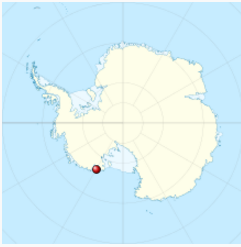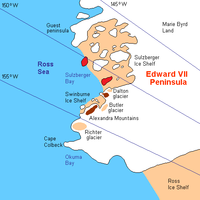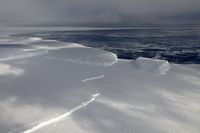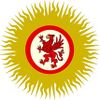Principality of Campinia
This article refers to a micronation or element of micronationalism which is defunct and no longer exists. You can help make the article reflect that or ask on the talk page for further information. |
Principality of Campinia | |||||||||
|---|---|---|---|---|---|---|---|---|---|
| Motto: Sapientia et Doctrina (Wisdom and Learning) | |||||||||
| Anthem: Wien Campiniaansche bloed | |||||||||
 St.Charlian claims in black upon its dissolution in 2017 | |||||||||
| Capital | Campinopolis | ||||||||
| Largest city | Kerkvliet (upon dissolution) | ||||||||
| Official languages | Dutch, English | ||||||||
| Demonym(s) | Campinian | ||||||||
| Government | Monarch | ||||||||
• Prince | Elias (last) | ||||||||
• Grand Constable | Shady Morsi (last) | ||||||||
| |||||||||
Campinia, officaly The Principality of Campinia (Dutch: Prinsdom Campinia) was an Antarctic micronation located in the Netherlands and Western Antarctica, with the residence of the Prince in Belgium. It claimed to be an independent sovereign state but received no recognition from world governments, and for this reason was often referred to as a micronation.
Campinia was originally founded on December 20, 2000, as the Grand Principality of Campinia. It was re-activated in 2010 by the Grand Prince Guillaume I. In 2012 the new Grand Prince, Guillaume II, changed the Grand Principality into a Principality, with the Prince as the Head of State. In 2013, Prince Guillaume II changed Campinia into a vassal of Flandrensis. Not much later he abdicated the throne to Elias I of Campinia who reformed the principality into a duchy. On 4 April 2017 Campinia was officialy dissolved by the Prince.
Campinia was a democratic, semi-developed micronation which scored 3.6 on Dresner's system of Classification. In addition, it was a "5th World" micronation, according to the Whole Picture calculation of the Boodlesmythe-Tallini System of Classification and Dan's System of Classification. On Miles' Scale of Economic Potential, Campinia scored a 3. Campinia was a member of the Grand Unified Micronational and the Union Against Micronational War as well a former member of the Flandrensisian Commonwealth and the Antarctic Micronational Union
Etymology
Campinia comes from the Latin word for campine (Kempen in Dutch) "fields" and "nia" which means land, the combination of the two words means "region of fields".
History
Campinia, at the time knew officially as the Grand Principality of Campinia, was created in 2000, but it fell inactive until 2010, when it was re-activated by Prince Guillaume I. In 2011, the Grand Principality was changed to simply the Principality of Campinia with a new head of state, Guillaume II. In February 2012 Campinia joined the Flandrensisian Commonwealth, not much later they became an Antarctic micronation and a member of the Antarctic Micronational Union. In 2013 Prince Guillaume II changed Campinia into a vassal of Flandrensis, not much later he abdicated the throne to Elias I of Campinia who reformed the principality into a duchy. The crisis begon in 2017 when a citizen, Shady Morsi claimed the throne, established a parlement and recruited citizens. After Flandrensis protested against this “coup d 'état”, Duke Elias confirmed that he didn't abdicate and it was all a huge misunderstanding: he sent an e-mail to Morsi with ""From me you may even lead the project, because I have not so much time." and so Morsi assumed that it was an abdication. Due to the international pressure, Morsi abandoned his claims on the Campinian Throne and entered into dialogue with Duke Elias of Campinia. Due to a lack of citizens and activty, Campinia was dissolved on 4 April 2017 by Elias.
Politics
Campinia was a constitutional monarchy since 2000, with the Prince of Campinia as head of state. The executive branch consisted of the Regent and the Grand Constable as the head of government, who presided over a ten-member Council. The Duchy was ruled by the Duke and the Council. Members of the Council of State were elected every four years
- Lord Chancellor: the desk where the charters and other documents were prepared, sealed, and promulgated.
- Lord Treasurer: he keeped the finance of Campinia in order.
- Keeper of the Seals: he keeped the Seal of Campinia save.
- President of the Council of State
The household of the Duke:
- Grand Chamberlain: keeper of the Royal Palace, he was in charge of all the staff.
- Grand Bouteiller: he wass in charge of the kitchen of the Palace.
Secretaries of State:
- Secretary of Foreign Affairs
- Secretary of Internal Affairs
- Secretary of Justice
- Secretary of Envorimental Affairs
- Secretary of Defence
- Secretary of Health
- Secretary of Culture
Nobility
As a monarchy, the Prince of Campinia could grant noble titles:
- Margrave / Margravine
- Count / Countess
- Viscount / Viscountess
- Baron / Baroness
- Knight Bachelor
- Lord / Lady
Campinia also has a rich history of heraldic orders:
-
The orders of the Conifer Cone
-
The Order of the Lion
-
The Order of Mary
-
The Order of the Red Griffin
-
The Order of the Star of Campinia
Geography


The Duchy of Campinia was located in Western Antarctica in the Sulzberger Bay. and consisted of the Islands, Moody Island and Vollmer Island. Moody Island is an ice-covered island 19 kilometres (10 nmi) long, between Kizer Island and Steventon Island in the Sulzberger Ice Shelf, Marie Byrd Land, Antarctica. It was mapped from surveys by the United States Geological Survey and from U.S. Navy air photos (1959–65), and was named by the Advisory Committee on Antarctic Names for E.L. Moody, a dog-driver with the Byrd Antarctic Expedition (1933–35)
Vollmer Island is an ice-covered island 20 kilometres (11 nmi) long, lying along the edge of Sulzberger Ice Shelf, 13 kilometres (7 nmi) northwest of Cronenwett Island. It appears that this feature was first observed and roughly mapped from aerial photographs taken by the Byrd Antarctic Expedition, 1928-30. Named by Advisory Committee on Antarctic Names (US-ACAN) for Lieutenant T.H. Vollmer, U.S. Navy, engineering officer aboard USS Glacier along this coast, 1961-62.






